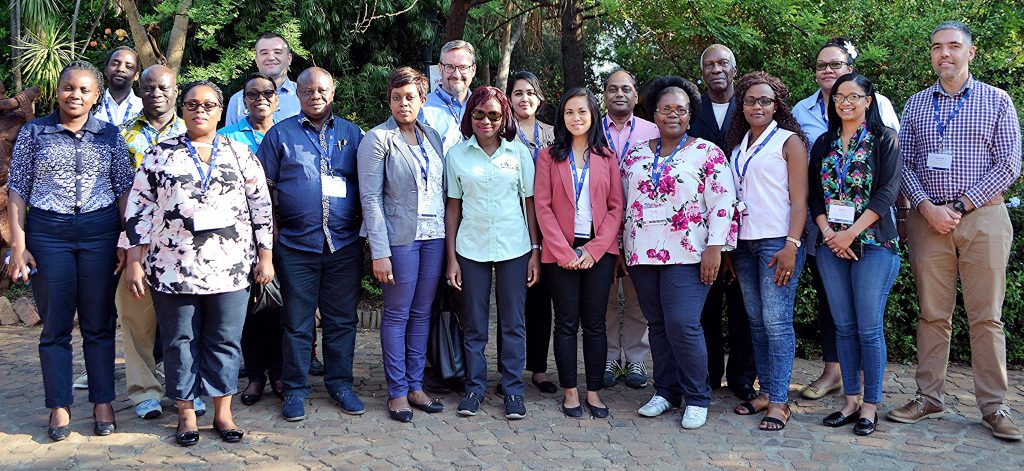
The Auditor-General of South Africa (AGSA) hosted the second WGEI Steering Committee Working Meeting, which was successfully held at AFROSAI-E’s premises in Pretoria from 25th-27th September 2018. Some of the main discussions tackled involved the status for the implementation of the WGEI Activity Plan 2017-2019, the rolling-out of WGEI products, and the strategies for engaging WGEI members and INTOSAI regional bodies. The theme of the external speakers’ presentations was “Illicit Financial Flows” with keynote speakers from the Financial Intelligence Centre of South Africa, South African Revenue Services and Department of Mineral Resources of South Africa.
The meeting was attended by the Steering Committee members as well as representatives from the Capacity Building Committee (CBC) and AFROSAI-E. Meeting presentations can be accessed here.
New Steering Committee members on board
As resolved in the Washington meeting last year, the number of WGEI Steering Committee (SC) members was increased from 5 to 10 members. In addition to SAI Uganda, USA, South Africa, Iraq and Norway, the current SC members also include SAI Zambia, SAI Ghana, SAI India, SAI Fiji and SAI Ecuador. This year’s meeting was therefore the first working meeting with the new WGEI Steering Committee member composition. The rationale for the expansion is both to ease the implementation of the WGEI activities and to ensure a Steering Committee with representatives from all INTOSAI regions. Currently, the Working Group has Steering Committee members from six INTOSAI regions, namely, AFROSAI, ARABOSAI, ASOSAI, EUROSAI, OLACEFS and PASAI.
Updates on the implementation of the WGEI Activity Plan
Promoting good governance as well as facilitating knowledge sharing and networking in the extractive industries (EI), are some of the goals the Working Group aspires to. In its Activity Plan, the Working Group has identified six main activities to be conducted in order to achieve its goals, whereby each activity is led by one or two SC members. During the working meeting in Pretoria, each Activity Leader reported on the status of their respective activity and laid out the tentative action plans for 2019.
Rolling out WGEI products and tools
2018 has also been a year of developing various WGEI products and tools. The Pretoria meeting therefore deliberated on the process of finalizing and rolling out these tools. These products include the “Briefing note on the role of SAIs in the extractive industries”, the “EI Training framework” and the “Extractive Industries Toolkit (EI Toolkit)”. The Briefing note aims to provide external stakeholders and the public a quick overview of the role of SAIs in the extractive industries as well as how SAIs can contribute to good governance in this industry. The second WGEI product, the EI Training Framework, lists the relevant topics to include and issues to consider in conducting EI trainings. It serves as a guide to SAIs in planning and providing trainings on the audit of extractive industries. Lastly, the EI Toolkit is a toolkit for auditors explaining each of the steps in the extractive industries value chain as well as the key considerations in auditing extractive industries. Moreover, it provides an overview of other relevant resources and guidance for auditors in conducting EI audits.
WGEI is about its members
As WGEI was established for the benefit of its SAI members, a number of discussions also touched on how WGEI can involve its members in its activities as well as engage the INTOSAI regional secretariats, to facilitate knowledge and experience sharing in the audit of EI. A first step in doing so was changing the composition of the SC to include members from different INTOSAI regions. Each Steering Committee member will therefore serve as an advocate for WGEI activities in their respective regions.
As a next step, each Steering Committee member will aspire to actively reach out to the SAIs and regional secretariats in their region. This is to ensure that the SAI community is aware of and informed about WGEI, its activities and how SAIs can benefit from it. As a Working Group, WGEI aims to create a platform where SAIs can exchange knowledge and experience about the EI, thereby contributing to strengthening SAIs’ capacity to conduct EI audits and promoting good governance and transparency in the extractive industries.





